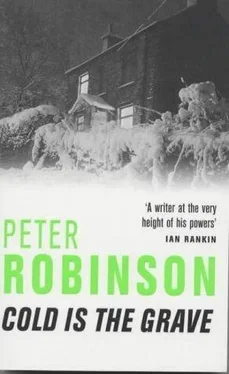She had two choices: either walk down to the swing bridge and wait a couple of hours for him to come by, or follow him at a safe distance. She decided on the latter course, partly because there were a number of possible diversions from the route. The Dales were crisscrossed by hundreds of footpaths, signposted or not, going off in every direction, not all of them listed in guidebooks. He could, for example, turn off by Calver Hill into Arkengarthdale for a different walk, or continue along the high dale to Gunnerside, though then it would take him much longer to get back to Grinton – more like for dinnertime rather than lunch.
Besides, even if she were only ten yards from him, he would never recognize her, not with the hat and the anorak, and not when he wasn’t expecting to see her.
Annie had always marveled at how, even in summer, you could walk for miles in the Dales and hardly see another soul. In winter you were far less likely to bump into someone. Along the tops, after emerging from Skelgate Lane into open moorland, she passed a small group of ramblers, probably a club, going the other way. Everyone politely said good morning as they passed by. After that, she couldn’t see a soul except Dalton, a good half mile or more ahead, wearing a distinctive red anorak. It certainly made him easy to keep in her sights.
The guidebook advised her to pause and enjoy views of Fremington Edge back in the east and Harkerside on the opposite side of the valley, but though she glanced occasionally at the cloud shadows drifting over the greenish-brown hillsides, with their distinctive patterns of drystone walls – one field shaped like a milk jug, another like a teacup – Annie was in no mood for sightseeing.
Still, up here on the heights looking down on the valley below reminded her of cliff walks around St. Ives with her father when she was younger. How he used to point out examples of interesting perspectives, shapes, textures and colors in the landscape, how he was always stopping to sketch frantically into the book he carried with him, eyes and brain tuned to his fingers. In moments like that she might as well not have been there; she didn’t exist.
All that was missing today was the crashing of the waves and the screeching of gulls. Instead, hares hopped through the spent heather, and grouse broke cover. The weather turned nasty for a few minutes along the daleside, with a brisk west wind whipping up and at one point blowing a brief hailstorm at her. She had had to lean forward into the wind to make progress, looking up occasionally to see the red anorak in the distance.
By the time she came to the steep descent into the village of Healaugh, the wind and hail had all gone, and as she walked through the quiet streets she could almost believe it was summer. A man in a white coat stood selling meat and vegetables to villagers from the back of a small van. Everyone paused and looked at her as she walked past. None of them smiled or said anything; they just stared. It was an odd feeling. They didn’t exactly seem unfriendly, but aloof, a little mournful even, as if they were telling her that their world was not hers and never would be, that she was merely passing through it and she should keep going.
She did.
Shortly beyond the village, which was the turning point in the walk, the path led her through a field down to the riverside. She could see Dalton’s red anorak ahead every now and then appearing and disappearing between the bare alders that lined the Swale. Empty brown seed cones still clung to many of the branches, making the trees look chocolate brown.
The closer she got, the more nervous and confused Annie became. She still wasn’t physically afraid of him, but Dalton’s arrival in Eastvale, and the memories it stirred, had played havoc with her usually calm emotional center. For one thing, she didn’t know what to say to him. What did you say to a man who had been a willing accessory to your rape, a man who would have raped you himself if you hadn’t managed to wriggle free from his grasp and escape? How would he react? Perhaps, she began to think, this wasn’t such a good idea after all. It would be easy enough just to turn left at the swing bridge and walk up to Reeth, where her car was parked on the cobbles by the green, and forget the whole thing, get back to work.
But she kept on going.
It was only a small bridge. At that point, the river meandered through meadowland where cows grazed. It was, however, a genuine swing bridge and Annie experienced a frisson of fear as she walked the wooden planks and felt it sway. While not exactly phobic, she had always been a little nervous of bridges, though she didn’t know why.
Dalton had paused by the riverbank at the other side, about a hundred yards or so ahead, and he appeared to be watching her approach. Feeling a little dizzy, Annie stayed on the bridge and pretended to admire the view, waiting for him to carry on. But he didn’t. He stayed where he was and kept on looking at her. Her heart was in her mouth. Did he recognize her? Had he known she was following him all along?
There was only one thing to do if she wasn’t going to run. She walked through the gate at the far end of the bridge and along the grassy path to where he stood. All the way he kept looking at her, but she still didn’t sense any recognition on his part. Her fear was quickly turning into anger. How dare he not recognize her after what he had done? She tried to take long deep breaths to keep herself calm and centered. They helped a little.
Finally, about five or six yards away from Dalton, she stopped and took off her hat, letting her wavy chestnut hair fall free to her shoulders. She saw the recognition now. He hadn’t known who she was before, she could tell, but he did now. She even heard his sharp intake of his breath.
“You,” he said.
“Hello, Wayne,” she said. “Yes, it’s me. Nice to see you again.”
Banks awoke from a disturbing dream at about eight o’clock on Sunday morning. He had been walking in an unfamiliar landscape, which kept switching between rural and urban settings. There was a river somewhere, or perhaps a canal. Whatever it was, there was a sense in the dream that it was never far away. It was always raining and always twilight, no matter where he was or how long he seemed to walk. Other people drifted by like shadows, but nobody he knew. He had the feeling that he was supposed to be following someone, but he didn’t know whom or why.
Suddenly he found himself on a green iron bridge, and a man was walking just in front of him. At that point, Banks felt panic gather, felt as if he couldn’t breathe and wanted to wake up and break out of it. The man turned. He wasn’t a monster, though, just a perfectly ordinary-looking man.
“I know you’ve been looking for me,” he said to Banks, smiling. “My name’s Graham Marshall. I was in the army. Then I had my hair cut. Now I’m in the rain. Emily’s with me, too, but she can’t appear to you right now.” Then he went on to tell a garbled life story of which Banks could remember nothing when he woke in a cold sweat to church bells ringing in the distance.
It was still dark outside, so Banks turned on the bedside light. He was in a small hotel near king’s Cross, not the place he had stayed with Annie and Emily. Somehow, going back there hadn’t seemed like a good idea.
When he had taken stock of himself, he realized with relief that he felt only mildly hung over. That was, he remembered, because he had declined the invitation to repair to Burgess’s flat and drink whiskey all night. Surely he wasn’t getting wiser in his old age? Anyway, he was glad that all they’d done was visit a few pubs and down a few pints. It must have been a dull evening for Burgess, though; they hadn’t got into any fights or picked up any women. Mostly, Burgess had talked about Clough, and Banks got the impression that even if he didn’t manage to pin Emily’s murder on Clough himself, the man’s days of freedom were limited.
Читать дальше












